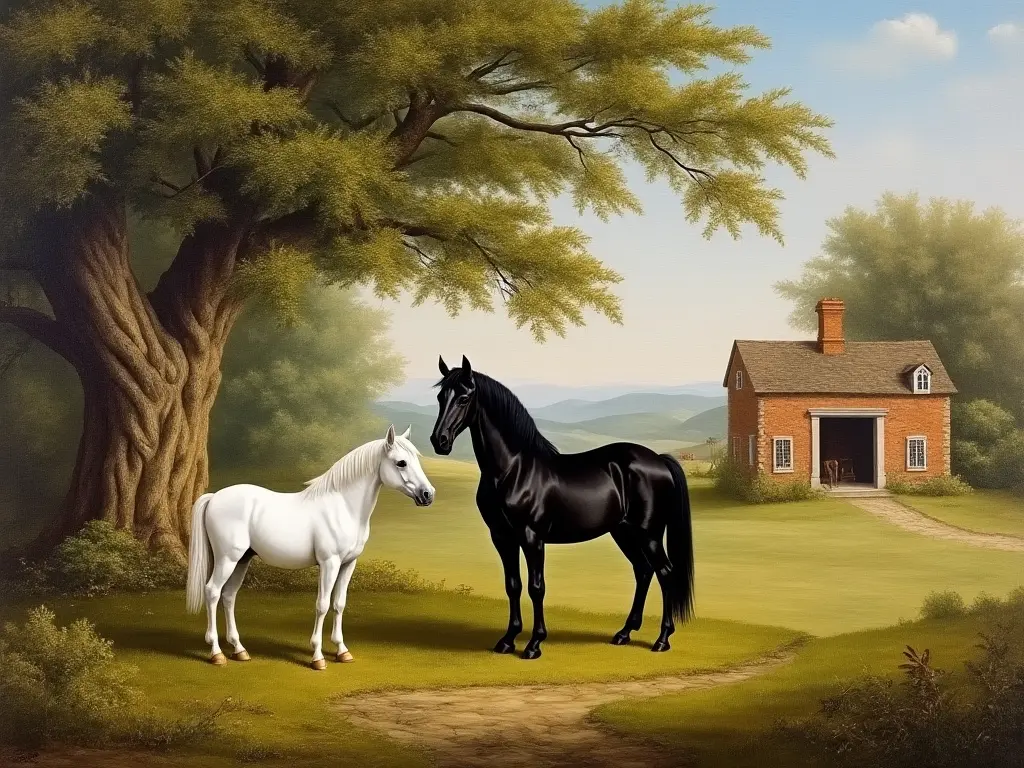
Chapter 9. Merrylegs
Mr. Blomefield, the vicar, had a large family of boys and girls; sometimes they used to come and play with Miss Jessie and Flora. One of the girls was as old as Miss Jessie; two of the boys were older, and there were several little ones. When they came there was plenty of work for Merrylegs, for nothing pleased them so much as getting on him by turns and riding him all about the orchard and the home paddock, and this they would do by the hour together.
One afternoon he had been out with them a long time, and when James brought him in and put on his halter he said:
“There, you rogue, mind how you behave yourself, or we shall get into trouble.”
“What have you been doing, Merrylegs?” I asked.
“Oh!” said he, tossing his little head, “I have only been giving those young people a lesson; they did not know when they had had enough, nor when I had had enough, so I just pitched them off backward; that was the only thing they could understand.”
“What!” said I, “you threw the children off? I thought you did know better than that! Did you throw Miss Jessie or Miss Flora?”
He looked very much offended, and said:
“Of course not; I would not do such a thing for the best oats that ever came into the stable; why, I am as careful of our young ladies as the master could be, and as for the little ones it is I who teach them to ride. When they seem frightened or a little unsteady on my back I go as smooth and as quiet as old pussy when she is after a bird; and when they are all right I go on again faster, you see, just to use them to it; so don’t you trouble yourself preaching to me; I am the best friend and the best riding-master those children have. It is not them, it is the boys; boys,” said he, shaking his mane, “are quite different; they must be broken in as we were broken in when we were colts, and just be taught what’s what. The other children had ridden me about for nearly two hours, and then the boys thought it was their turn, and so it was, and I was quite agreeable.
They rode me by turns, and I galloped them about, up and down the fields and all about the orchard, for a good hour. They had each cut a great hazel stick for a riding-whip, and laid it on a little too hard; but I took it in good part, till at last I thought we had had enough, so I stopped two or three times by way of a hint. Boys, you see, think a horse or pony is like a steam-engine or a thrashing-machine, and can go on as long and as fast as they please; they never think that a pony can get tired, or have any feelings; so as the one who was whipping me could not understand I just rose up on my hind legs and let him slip off behind — that was all. He mounted me again, and I did the same. Then the other boy got up, and as soon as he began to use his stick I laid him on the grass, and so on, till they were able to understand — that was all. They are not bad boys; they don’t wish to be cruel. I like them very well; but you see I had to give them a lesson. When they brought me to James and told him I think he was very angry to see such big sticks. He said they were only fit for drovers or gypsies, and not for young gentlemen.”
“If I had been you,” said Ginger, “I would have given those boys a good kick, and that would have given them a lesson.”
“No doubt you would,” said Merrylegs; “but then I am not quite such a fool (begging your pardon) as to anger our master or make James ashamed of me. Besides, those children are under my charge when they are riding; I tell you they are intrusted to me. Why, only the other day I heard our master say to Mrs. Blomefield, `My dear madam, you need not be anxious about the children; my old Merrylegs will take as much care of them as you or I could; I assure you I would not sell that pony for any money, he is so perfectly good-tempered and trustworthy;’ and do you think I am such an ungrateful brute as to forget all the kind treatment I have had here for five years, and all the trust they place in me, and turn vicious because a couple of ignorant boys used me badly? No, no! you never had a good place where they were kind to you, and so you don’t know, and I’m sorry for you; but I can tell you good places make good horses. I wouldn’t vex our people for anything; I love them, I do,” said Merrylegs, and he gave a low “ho, ho, ho!” through his nose, as he used to do in the morning when he heard James’ footstep at the door.
“Besides,” he went on, “if I took to kicking where should I be? Why, sold off in a jiffy, and no character, and I might find myself slaved about under a butcher’s boy, or worked to death at some seaside place where no one cared for me, except to find out how fast I could go, or be flogged along in some cart with three or four great men in it going out for a Sunday spree, as I have often seen in the place I lived in before I came here; no,” said he, shaking his head, “I hope I shall never come to that.”